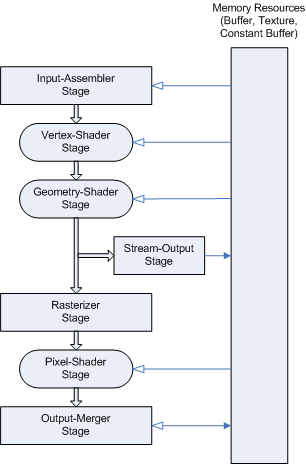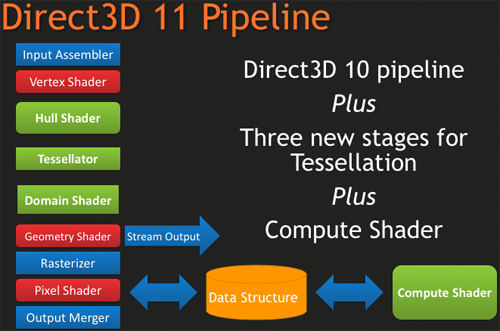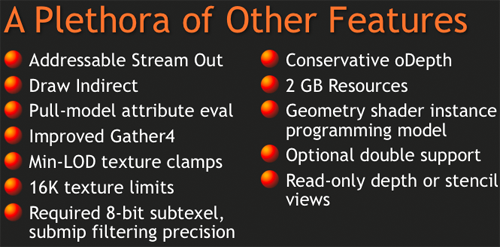Introducing DirectX 11: The Pipeline and Features
This is DirectX 10.

We all remember him from our G80 launch article back in the day when no one knew how much Vista would really suck. Some of the shortfalls of DirectX 10 have been in operating system support, driver support, time to market issues, and other unfortunate roadblocks that kept developers from making full use of all the cool new features and tools DirectX 10 brought.
Meet DirectX 11.

She's much cooler than her older brother, and way hotter too. Many under-the-hood enhancements mean higher performance for features available but less used under DX10. The major changes to the pipeline mark revolutionary steps in graphics hardware and software capabilities. Tessellation (made up of the hull shader, tessellator and domain shader) and the Compute Shader are major developments that could go far in assisting developers in closing the gap between reality and unreality. These features have gotten a lot of press already, but we feel the key to DirectX 11 adoption (and thus exploitation) is in some of the more subtle elements. But we'll get in to all that in due time.
Along with the pipeline changes, we see a whole host of new tweaks and adjustments. DirectX 11 is actually a strict superset of DirectX 10.1, meaning that all of those features are completely encapsulated in and unchanged by DirectX 11. This simple fact means that all DX11 hardware will include the changes required to be DX 10.1 compliant (which only AMD can claim at the moment). In addition to these tweaks, we also see these further extensions:

While changes in the pipeline allow developers to write programs to accomplish different types of tasks, these more subtle changes allow those programs to be more complex, higher quality, and/or higher performance. Beyond all this, Microsoft has also gone out of its way to help make parallel programming a little bit easier for game developers.










109 Comments
View All Comments
DerekWilson - Saturday, January 31, 2009 - link
These figures include "shipped" versions of Vista that people chose to downgrade to XP. It includes systems that came preinstalled, even the "vista capable" systems that people might have chosen to replace with another OS out of the box or after it didn't deliver what they expected.No Vista isn't as bad now as it was at first, but that first impression really does matter and significantly affected DirectX10 adoption, development efforts, perception, and all sorts of things that have a lasting impact on the entire industry.
Also, MS designed DX10 to be tied to the WDDM when they didn't need to in order to expose functionality for developers to use the new features of hardware. They didn't need to do this at all, and we could have had DX10 and DX11 on XP if MS hadn't wanted to push sales of Vista through needless requirements that tied future versions of DirectX to it.
michal1980 - Friday, January 30, 2009 - link
Vista bigger problem was Image. It started a bit rocky, and by the time it was 'fixed' people allready wrote it off. M$ was/is smart enough to know a damaged brand, and instead of releasing Vista Sp2, they slapped a new name on it.I do have a bit of a chip on my should about win7, from what I read, i'd love to upgrade.
But good lord, I own 2 ultimate, and 3 home preimum licenses. I hope M$ has some nice deals for vista users, because i'm going to feel a bit ripped of having an OS with a 2 year life span.
frozentundra123456 - Sunday, February 1, 2009 - link
I agree that it is a ripoff to have an OS with such a short life span. Is the "planned obsolescence" in the worst form??LeStuka - Saturday, January 31, 2009 - link
I read somewhere that Vista Ultimate owners will get a free/reduced price upgrade.. Not sure how reputable that is (my memory is a bit hazy on it) but is defiantely worth some research.marsbound2024 - Friday, January 30, 2009 - link
Let me start off by saying I was enthralled by this article. Very well detailed and well explained. There were a few occasions, however, where I wished for more explanation (or maybe my eyes skipped over an explanation you might have provided earlier in the article). I will admit, I am not as highly inclined on software as many people might be here. I am a great deal more interested in hardware usually, but when it comes to APIs such as DirectX and operating systems and their features such as Windows 7, then I am usually engrossed in those. What exactly are LODs and what is OOP constructs and what is HLSL? Now admittedly I can use Google to find all of this out, but it would be nice to have this consolidated into your article (if it was, but my eyes skimmed over that part, then I apologize; though I read your article pretty much word for word).There are a few grammatical errors such as instead of "that" you put "than" or maybe it was "then" and you said "a architectures" or something to that effect. This doesn't really matter but I thought I'd throw that out there.
I'd really like to know if the upcoming generation GPUs in June/July will make use of DirectX11? I suppose this depends on how quickly Microsoft can a good, full-featured SDK out there, perhaps. Also, albeit a bit off-topic, but any thoughts on when Windows 7 might be released to consumers? Are we still thinking later this year in time for the holiday season or the old Microsoft "by the first quarter of 2010" or whatever it was (i.e.: January possibly)?
DerekWilson - Saturday, January 31, 2009 - link
Sorry about leaving out some definitions there ... I went back and added in some explanation of what HLSL and OOP stand for and what LOD is.We suspect that the first round of hardware that comes out after Windows 7 is available will support DX11 ... We haven't had confirmation on that from either vendor yet, but that's our strong feeling at this point.
michal1980 - Friday, January 30, 2009 - link
Author just seems to have a huge chip on his shoulder.good article, that quite frankly left a bad taste in my mouth because of the unexplained, and un-needed vista bashing
tommy2q - Saturday, January 31, 2009 - link
vista 64 bit has been great for me. it's faster than xp pro on my computer and more stable.DerekWilson - Friday, January 30, 2009 - link
I don't have a problem explaining myself, I just thought it was unnecessary -- I apologize.It's not that I have a chip on my shoulder, it is simply a fact that Vista had and has problems that caused issues with the uptake of DX10. It's not a personal problem, it's just information.
First, obviously an OS upgrade was required to get DX10. People were turned off to this idea because of initial problems that were resolved after a period of time. But much damage was done.
For the first year of it's life, many drivers and applications were unstable and buggy, especially sound and graphics and especially under 64-bit Vista. MultiGPU support had its own problems, but that's a whole other barrel of monkeys. When SP1 hit most of our problems were resolved.
Performance for many tasks are decreased under Vista, though, again, much of this has been fixed. But the problem is that uptake of Vista was damaged because of this, especially among hardcore gamers and especially because there weren't any DX10 only titles or Vista only titles that were compelling (and no, Lost Planet was not compelling). Also, in cases like Crysis, DX10 incurs a huge performance hit and many gamers prefer to run DX9 anyway for the higher performance.
OS X also made huge strides and is a terrific OS. For usability, people have started to realize they had a choice in large part because Vista failed at the beginning to deliver what it promised. And choice is good.
MS recognized that they had a problem and implemented and extended again and again downgrade options to Windows XP for customers who were unsatisfied with Vista. They have significantly invested in and sped up development on Windows 7 in order to deliver an option that will regain customer interest. They've also dumped tons of money into ad campaigns like mojave and seinfeld.
Vista is not a failure in terms of total sales or market penetration as compared to other pieces of software, but it absolutely is compared to other major milestone MS OS releases. They needed to deliver a WinXP and they delivered a WinME ...
The degree to which people hung on to XP and the problems with Vista have certainly caused a delay in a full transition to DX10 programming by game developers.
Vista failed to be truly viable vehicle for pushing forward graphics technology on the whole not because it totally sucks, is lame, or any one person doesn't like it. It failed on its merits because it didn't come out of the gate as strong as it needed to be.
Certainly many developers have done some cool things with DX10. Which is great. But building a platform where people like the Beta more than their current stable OS is a good start to getting people interested in dropping Vista for Windows 7 and inspiring hold outs to finally move from Windows XP to Windows 7.
I wasn't trying to "bash" vista. I feel like I was just calling it like it is.
archer75 - Saturday, January 31, 2009 - link
All of the "problems" with Vista you mentioned actually aren't even Microsoft's or Vista's fault. Drivers are applications are the responsibilities of 3rd parties. It is they who dropped the ball. Most companies grew up with XP and that is what people learned to write drivers and apps for. With the necessary change to the driver model in Vista these people had to learn a new way of writing drivers. A necessary change but it took time.Also everything that SP1 fixed, was fixed long before SP1. All of those updates were available on the knowledge base. All SP1 did was put them in one neat little package. People like myself had those updates long before SP1.
I also run x64 and have since beta. My system has had quality drivers on day 1 and I never had any stability issues either.
Obviously an OS upgrade was required for DX10. And why wouldn't it be? Do you give away all of your new features in your old products? What company does that? You put new features in new products. Apple does this. Hell, ilife 09 is leopard only. They force you to upgrade regularly.